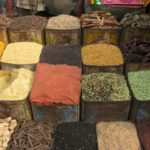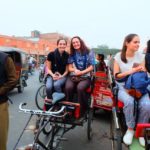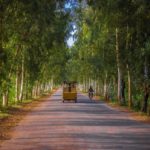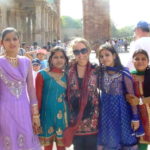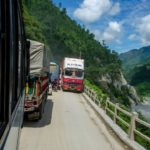India Travel: A Rare Visitor to an Isolated Spot

Once again, I find myself hovering over a ceramic hole whilst violently emptying my bowels. This seems to have become a common theme of the trip. I leave the wooden door poised half-open and look out onto the dusk-quilted Himalayas, both horrified and mesmerised. As I fix my gaze on the melting orange ball falling below the jagged lines of the mountains, a dragonfly lands on the edge of the door frame. It is delicious, dressed in aqua and ready for the glamorous purple party of evening.
I am staying in Kumbahala, a rural village in the foothills of the Himalayan Pabbar Valley. For a few weeks I am living with a local family in a room above two cows, a sheep and a goat. I am supposed to be teaching English but the school is closed for the summer. Instead I am treated as a guest and queen, a rare visitor to an isolated spot. As I rise each morning to help the family weed over their tomato plot, I am carefully placed in the shade of an apple tree to watch as they carry out the hard work. Each time I try to leave my seat and join in, I am calmly placed back into position and pacified with another piece of fruit. These little nutritious prizes are most probably the cause of my current regular relays to the toilet.
I am treated as a guest and queen, a rare visitor to an isolated spot.
It is apricot season, or “tool” as the villagers call it. The soft yellow fruit is falling from every tree around the house and surrounding area. I walk with my surrogate mother – mysterious enough that she will never tell me her name, a mountain woman who I imagine can breathe fire – to pick some of the fruit.
We start on the ground, taking what is good, then working our way up to the branches. Nothing is wasted despite the plentiful supply. Mother already knows that the current abundance will come to a brutal end when the snows start in the winter months. It is then that the ten kilometre journey her daughter Mila takes to school everyday on foot becomes a less inviting path and one I doubt she always pushes herself to walk.
India Travel: a Rare Visitor to an Isolated Spot
Recently, Mila abandoned the opportunity to study at a private school in the nearby town, opting instead to return to the village and live with her family. More than her education, Mila spends time helping her Mother cut and carry grain for the animals and tend the tomato plots for selling at a market in Delhi. As long as the seasons keep ticking over and providing for their land, the family is able to support itsef independently and live in the bewitching presence of the mountains with relatively little disturbance. As an outsider, I am constantly debating my roles as intruder and observer. The social conscience in me wants to leave the villagers to it but the writer in me is guiltlessly stimulated.
The fruit we carry back to the house – still slightly turning my stomach with thoughts of the large quantity I had ingested – is set out on the porch of their single-room house. Mother, Mila and I sit, three witches in the quiet of the afternoon, whispering to the surrounding pine trees of ancient recipes. Mother shows me how to break the tool in two with a single squeeze. Mila places two metal bowls in front of us and Mother tosses the fruit into one.
Before doing the same with the stone in the middle, she picks up a nearby rock and smashes the large seed in two, startling me with her sudden act of violence. The sound echoes through the valley and I wait for it to reach me again, having travelled a circular path. Its ringing noises see things in those few seconds that many will not see in a lifetime. When it reaches me again, it is barely a whimper.
As an outsider, I am constantly debating my roles as intruder and observer. The social conscience in me wants to leave the villagers to it but the writer in me is guiltlessly stimulated.
I look at Mother and she smiles warmly, holding up a small brown nut. Our lack of a mutual language – English or Hindi – means we have learned to communicate through gesture. She passes the nut to me, the secret hidden inside the stone. I look at it before putting it in my mouth, a tiny piece of the valley, a gift from the nameless woman of the hills. I crunch down on it, wondering how quickly it will pass through me and whether it will leave a trace.
We carried on sorting through the fruit, leaving some to dry out in the sun and others in a plastic gallon to ferment into alcohol. As the light drops, my stomach has settled. I watch another dragonfly sitting still on the steps and close my eyes. I breathe in deeply and think of the many layers that had hidden the nut from my knowledge, that inside that kernel are more layers of unreachable depth. I think of all that we cannot communicate and I cannot picture it. Instead, I carve into my memory Mother’s face, hoping its deep lines will reveal something to me in years to come.
India Travel: a Rare Visitor to an Isolated Spot, top photo credit by Unsplash.

